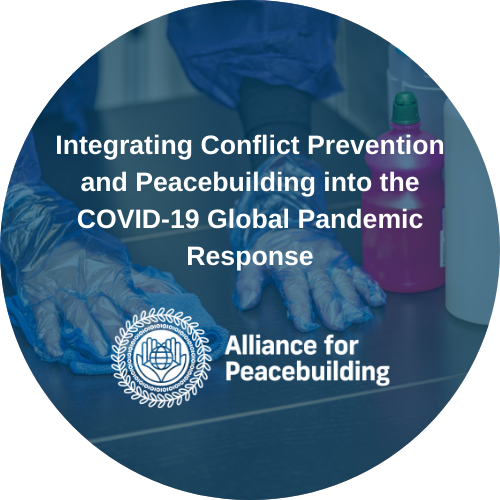Integrating Conflict Prevention and Peacebuilding into the COVID-19 Global Pandemic Response
Publisher: Alliance for Peacebuilding
Authors: Liz Hume, Megan Corrado, Megan Schleicher, and Nick Zuroski
Publication date: October 2021
Abstract: In July 2020, shortly after the pandemic began, the Alliance for Peacebuilding released a policy brief stating that the COVID-19 global pandemic is more than just a health crisis because it is fueling “stabilization in reverse.” The policy brief recommended donors and policymakers significantly integrate peacebuilding and conflict prevention in their COVID-19 strategies. Even after a few months in the spring of 2020, the data showed the pandemic was increasing instability and violence and exacerbating conflict dynamics in conflict affected and fragile states, while contributing to increasing instability in democracies, including the United States. Unfortunately, even as the evidence demonstrates that COVID-19 is compounding conflict dynamics, government and multilateral donors are not meaningfully integrating conflict prevention and peacebuilding in their strategies; this failure continues more than a year later.
Recommendations:
1 The State Department and USAID should revise the current COVID-19 strategy with an integrated approach that puts peacebuilding and conflict prevention at the center, while building on research, lessons learned, and failures from previous U.S. Government operations.
2 The international community must increase and sustain foreign assistance to contain this pandemic and link objectives of the strategy and its implementation plan with assistance resources and monitoring.
3 Exercise vaccine diplomacy and provide an adequate and sustainable vaccine supply to developing countries with a peacebuilding and conflict prevention approach.
4 Do not shortchange standalone peacebuilding programs.
5 Ensure mental health programs are well-resourced to address the significant psychological trauma from COVID-19.
6 Engage local actors, including women, youth, faith leaders, and other marginalized communities, to prevent and contain the pandemic and ensure stability.

